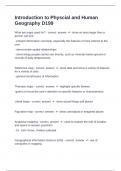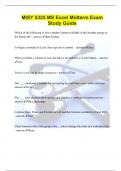Exam (elaborations)
Introduction to Physcial and Human Geography D199 Questions with complete solution
- Course
- Institution
Introduction to Physcial and Human Geography D199 Questions with complete solution Introduction to Physcial and Human Geography D199 What are maps used for? - correct answer - show an area larger than a person can see - present information concisely, especially the features of most interest ...
[Show more]




